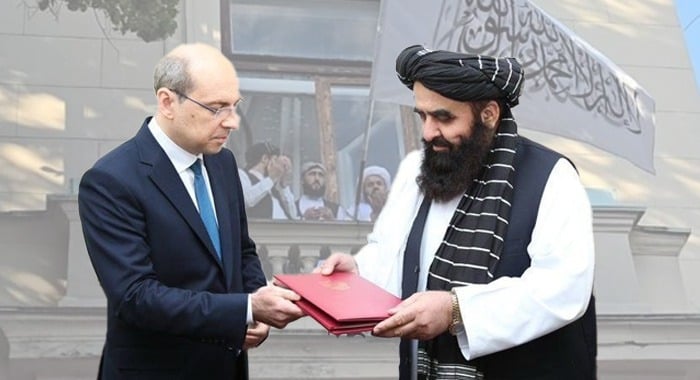Russia’s official recognition of the Taliban on July 3, 2025, marks a troubling and consequential shift in regional geopolitics. By becoming the first country to formally acknowledge a regime that seized power through force and continues to govern without legitimacy, Moscow has effectively redrawn the diplomatic map of Central and South Asia. This recognition is not merely a tactical move it is a strategic endorsement that threatens to undermine international norms, embolden militant movements, and further destabilize an already volatile region.
Since the Taliban’s return to power in August 2021, their governance has been defined by repression, human rights violations, and a refusal to form an inclusive government. Women have been almost entirely erased from public life, minorities live in fear, and basic freedoms remain non-existent. Far from evolving, the Taliban continue to impose a rigid ideological system that has plunged Afghanistan deeper into isolation and economic despair. Russia’s recognition, therefore, cannot be viewed as a neutral diplomatic act it is a stark departure from principles that once sought to prevent the normalization of militant regimes.
Russia’s decision appears driven by a combination of opportunism and strategic anxiety. By officially recognizing the Taliban, Moscow aims to position itself as a power broker in Central Asia, capable of outmaneuvering the West and countering China’s growing footprint in Afghanistan. Moscow also hopes to secure economic interests, particularly in energy and grain exports, while establishing influence in the corridors of infrastructure development and natural resource exploitation.
However, this recognition also reflects Russia’s security concerns. With the Islamic State of Khorasan Province (IS-K) mounting deadly attacks across the region including targeting Russian diplomatic missions Moscow appears to have concluded that engaging with the Taliban is the lesser of two evils. But such reasoning is dangerously short-sighted. The Taliban’s track record on containing terrorism is questionable at best. Their tolerance or at times, complicity with extremist actors raises serious doubts about their capacity or willingness to serve as a bulwark against transnational threats.
By granting formal recognition, Russia has broken ranks with the international community’s position that legitimacy cannot be achieved through violence. This move sends a damaging signal: that armed insurgency, when sustained long enough, can be rewarded with diplomatic acceptance. Such a precedent risks encouraging other non-state actors and militant groups to pursue power through violence, with the expectation that geopolitical interests may override international law and norms.
Moreover, Russia’s recognition undermines the efforts of Afghans both within and outside the country who continue to advocate for democratic governance, human rights, and an end to extremist rule. It sidelines those voices and elevates a regime that has systematically silenced them.
In geopolitical terms, Russia’s move reignites a version of the 19th-century “Great Game,” with Afghanistan once again caught between competing regional powers. China, Iran, Pakistan, Turkey, and the Central Asian republics now face pressure to reassess their positions. A domino effect of recognition could follow not out of ideological alignment, but driven by strategic necessity.
This recalibration may lead to Afghanistan’s deeper integration into Russia- and China-led economic blocs such as the Eurasian Economic Union or the Belt and Road Initiative. But this potential comes with immense risk. The Taliban lack the institutional capacity, internal cohesion, and economic stability to become a reliable partner in regional development. Their continued repression and failure to address humanitarian crises will only deepen Afghanistan’s dysfunction and could export instability across borders.
Moscow may believe it can manage the Taliban, contain terrorism, and exploit Afghanistan’s economic potential but history offers little support for such confidence. The Soviet Union’s own disastrous military intervention in Afghanistan from 1979 to 1989 should serve as a cautionary tale. Today’s strategy may be more diplomatic than military, but the risks are no less real.
Terrorist networks, cross-border militancy, narcotics trafficking, and refugee flows all remain urgent challenges that recognition alone will not resolve. If anything, formal endorsement could embolden the Taliban’s hardliners, reduce incentives for reform, and diminish prospects for future dialogue on governance and rights.
Russia’s recognition of the Taliban is not a neutral geopolitical move it is a dangerous gamble that legitimizes a regime with a deeply regressive and violent history. While framed as pragmatism, this decision undermines international norms, emboldens armed movements, and risks fueling further instability across the region. Rather than stabilizing Afghanistan, it may very well accelerate its descent into deeper authoritarianism and regional insecurity.
The new Great Game has begun but this time, its rules threaten to reward those who rule by the gun, not the ballot. The world must be cautious not to confuse short-term strategy with long-term stability.





